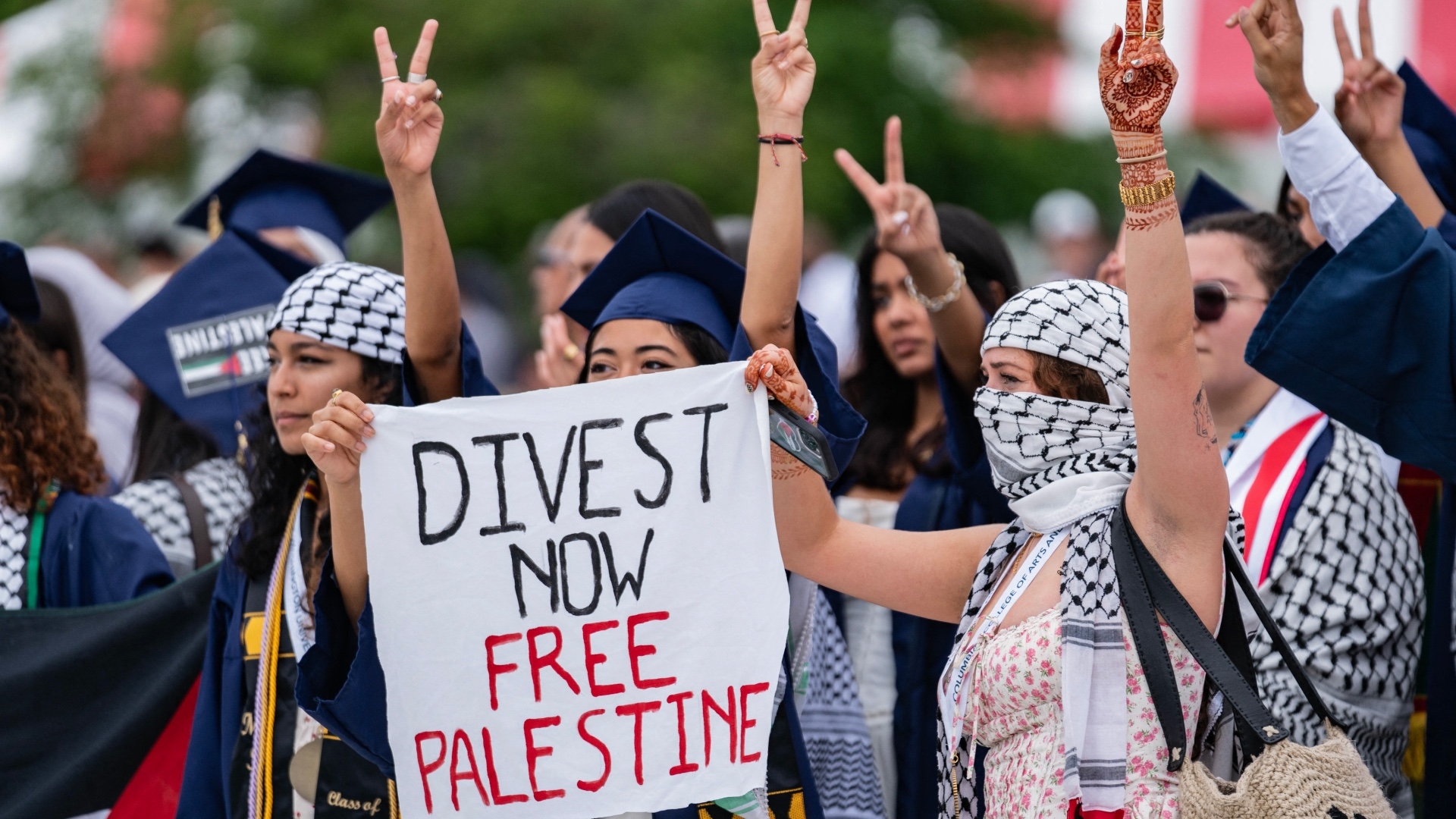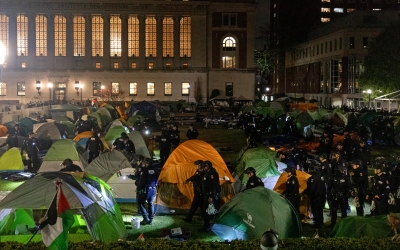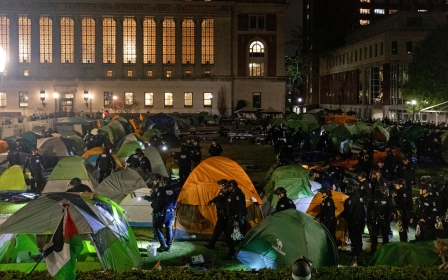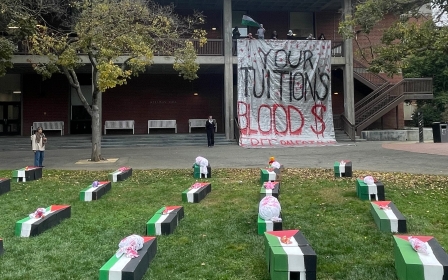As student protests persist, will universities allow another Kent State Massacre?

"We're back bitches," read a banner hung up by the Columbia University Students for Justice in Palestine on Saturday. The group that helped spark the "student intifada" on university campuses worldwide to end the genocide in Gaza returned for alumni weekend and made it clear that they had no intention of backing down.
Since the first encampment launched on 17 April, in tandem with the latest congressional hearing to suppress pro-Palestine student activism, observers everywhere have been watching the ever-changing developments within higher education.
Since 7 October, university administrators have instituted a number of repressive policies and taken disciplinary action against students, from suspension and eviction from their dormitories to surveillance and expulsion. Some have unabashedly invited security agencies and state and local police to interrogate, arrest and violently suppress protesters.
The responses have ranged from the blatantly brutal to the silent yet equally dangerous.
New MEE newsletter: Jerusalem Dispatch
Sign up to get the latest insights and analysis on Israel-Palestine, alongside Turkey Unpacked and other MEE newsletters
To find out why university administrators subjected their students to such treatment and to understand the nature of the encampments that have taken over the country, I travelled to multiple campuses both in my home state of California and in others across the country.
The interviews I conducted with student organisers and eyewitnesses from six universities revealed a story about the divide between administrators and their students shaping American academia. Most have asked to remain anonymous due to threats of doxxing and other professional repercussions.
Repressive measures
On 30 April, police rushed into the University of New Mexico (UNM) Student Union Building (SUB), which pro-Palestine student protesters had occupied earlier that morning.
Their demands were clear: "Put divestment from Israel on the board of regents' agenda and publicly release all information of investments with Israel and the war machine," a senior organiser of the student solidarity encampment told me.
'Some of the protesters began to sing, which aggravated the cops and led them to throw those protesters to the ground and beat them up'
Over 40 UNM student organisations co-sponsored a divestment bill based on a 1985 bill to divest from apartheid South Africa.
The student described that "between 50-60 police officers and state troopers, some with full riot gear, approached the SUB from all entrances, seemingly wanting to push protesters out. Some of the protesters began to sing in response, which aggravated the cops and led them to throw those protesters to the ground and beat them up until they couldn't walk or suffered concussions".
That night, the police arrested 16 students, graduate workers and alumni, with many suffering severe injuries. One student was reportedly placed in solitary confinement, and several more stated that they were called hateful, including homophobic, slurs by officers.
The student explained that UNM President Garnett Stokes stated that no one was injured, yet she was seen outside the SUB watching her students getting brutalised. "She stated nobody got hurt when we have comrades that have bruises the size of baseballs and nerve damage from being zip-tied. The administration even put out an alert when they took over the SUB saying Albuquerque Metro Crime Stoppers pays up to $1,000 for anonymous tips leading to an arrest."
Follow Middle East Eye's live coverage of the Israel-Palestine war
At the University of Texas at Austin, President Jay Hartzell and Texas Governor Greg Abbot came together on the decision to send in Texas state troopers on horseback, along with Austin police, to surround, tackle, and arrest more than 70 students on 24 April.
Reem, a doctoral student, described how state troopers and officers "arrested people at random, violently pushing them off the lawn" after the Palestine Solidarity Committee (PSC) student group organised a protest that afternoon.
She continued: "I had to run or get trampled on by the horses. Police were even dragging an older man who was bleeding from his head. Even those who were running away were getting tackled by police. The [police and state troopers] came again on Monday, 29 April, during a protest. I heard flash-bangs from a distance, students being pepper sprayed and punched by police, and an officer even attacking a clearly disabled person."
In a statement addressing the brutal crackdown, Hartzell claimed that these events occurred because protesters ignored "continual pleas for restraint and to disperse immediately. The university did as we said we would do."
However, several witnesses reported seeing the lead coordinator of the PSC get arrested immediately after telling protesters to disperse.
"We were in shock after that," Reem described. "We didn't do anything wrong to deserve that kind of response and were left feeling unsafe, unprotected and betrayed by the president standing against his own students."
Similar scenes played out on other campuses, including at Columbia University, where 109 students were arrested after President Nemat "Minouche" Shafik called in the NYPD to break up their encampment.
By now, videos of police at various campuses brutalising and arresting students en masse have flooded social media feeds. But, in other instances, such as what took place at the University of California, Los Angeles (UCLA), they stood by, allowing violent and racist mobs to storm a pro-Palestine encampment and attack peaceful protesters.
On 30 April, masked pro-Israel "counter-protesters" forcibly entered UCLA's Dickson Plaza and reportedly sprayed irritant gases on the students, attacked them with firecrackers, and beat protesters with metal poles while blasting the sound of screaming babies.
The vilification of Arab, Muslim, Black, Native, and Jewish anti-war protesters as terrorists and antisemites is weaponised by police and pro-Israel extremists to scare protesters
Despite students' pleas for help, UCLA security guards, campus police, and LAPD officers refused to act and watched as peaceful protesters were violently attacked.
While many administrators employed violent means to suppress the student movement, others, particularly at prestigious universities like Stanford, Harvard and the University of Chicago, have waged a "cold war" against students by sanctioning them or punishing them quietly for their activism.
Those involved in pro-Palestine protests have faced suspension, expulsion and the withholding of their degrees. Harvard student organiser Mahmoud al-Thabata expressed concern that some international students were threatened with deportation if they continued their activism.
While this type of response gets far less media attention, many students have criticised it as more punitive than arrest. They may be willing to sacrifice days in jail, but not the degrees they spent thousands of dollars on and countless hours working towards.
Smearing students
In order to justify the extreme measures against students, several politicians and university presidents have smeared these protests as inherently antisemitic. Yet no substantial data is proving that such antisemitism is displayed at the demonstrations or even driving them.
In fact, a study from the Armed Conflict Location and Event Data Project (Acled), an international NGO that collects real-time data on protests and armed conflict worldwide, shows that since 7 October, 97 percent of student demonstrations in the US have remained peaceful.
Additionally, every single encampment or demonstration mentioned has included Jewish-led coalitions and organisations, such as Jewish Voice for Peace, and a significant number of Jewish students, many of whom even performed Shabbat inside the encampments.
Given the peaceful nature of these demonstrations, many have asked what exactly is so threatening about these students that university administrators feel justified in their response - including the arrest of more than 2,100 people.
The answer lies with Hisham Awartani, the keffiyeh-clad Palestinian-American student at Brown University who was shot last November, along with his two friends, in what many believed was a hate crime.
Awartani, a soft-spoken young man who speaks with a subtle yet captivating confidence reminiscent of Ghassan Kanafani, has been hailed as a symbol of Palestinian steadfastness in the US since his attack.
"Police protect the political institutions and the status quo. What is happening across the country is definitely shaking the status quo and these institutions, and they are afraid of this. And there is no question that the media vilification [of the protests] incites the police and the counter-protesters," he observed.
In their coverage of the protests, US mainstream news outlets have largely parroted the talking points of Israeli and American political elites and demonised the pro-Palestine protesters. In one particularly malicious - though hardly unusual - broadcast, MSNBC host Joe Scarborough defamed the students as "Hamas on college campuses that wish to wipe out all Jews".
The vilification of Arab, Muslim, Black, Native, and Jewish anti-war protesters as terrorists and antisemites is weaponised by both police and pro-Israel extremists to scare protesters and force them to give up their beliefs and demands.
A different approach
At Brown, Awartani and a fellow student organiser commended their university administration for not resorting to violence against students and shifting its approach.
After pressing charges against 41 student protesters for trespassing in December, Brown significantly changed its course of action in the months after. The university declined to arrest or send police to raid the student encampment or to pursue further disciplinary action against protesting students.
Universities should unequivocally follow the model of negotiation and respect the demands of the student movement for Palestine
Brown became one of the first universities to reach a deal with student protesters, who agreed to take down their encampment after administrators pledged to discuss and vote on divesting funds from Israel later this year.
"This deal was the best we could get at the time," said Awartani. "The goal was to get concessions. Everybody but the board of directors supports divestment, from the student government to faculty coalitions. The question is whether the board will uphold the university as a respected educational institution or treat it like a glorified investment bank."
The Brown deal inspired other universities to negotiate with protesters. Universities like Evergreen State College, Northwestern, and Sacramento State all agreed to pursue investment strategies that were divested from corporations and funds that profit from genocide and ethnic cleansing. They also agreed to end study abroad programmes with Israeli institutions.
Universities should unequivocally follow the model of negotiation and respect the demands of the student movement for Palestine.
Arresting, brutalising and withholding degrees from students demanding divestment from a state that has destroyed every single university in Gaza and killed more than 36,000 Palestinians is simply not working.
In fact, it is emboldening students even further. The students interviewed all observed the outpouring of support for the encampments that were violently attacked, which only grew in size. The crackdown has also strengthened solidarity among students against the forces of repression, including aggressive police forces, bigoted counter-protesters, and narrow-minded administrators.
zionists are making threats to bomb columbia university. But it is Palestinian students who are seen as “violent”. https://t.co/BRnIm62kqM
— Layla 🪬 (@itslaylas) June 3, 2024
Some incoming freshmen have even posted on social media their intent to join or set up an encampment in the fall semester, showing there is no sign of students stopping their protest.
At the same time, the potential for a deadly incident looms over those familiar with the threat that militarised police forces and far-right groups pose against young people of colour.
Many students, including Awartani, who experienced first-hand the potentially fatal consequences of anti-Palestinian media and politicians, expressed concerns about another Kent State massacre.
"The vilification of protesters fuels the police and extremists. It makes me even more worried when you consider that people who attack protesters get off easier than the protesters. Look at the punishment given to the people who took part in the chemical attack against protesters in Columbia. The response is completely disproportionate. In terms of attacks by extremists, we've seen protesters get attacked, and police just watched," he said.
The ball is ultimately in the court of university leaders. Will they heed the legitimate demands of the dedicated student protesters, or will history attest to their complicity and failure to protect their students from violent arrest and brutalisation while they watched it happen?
The views expressed in this article belong to the author and do not necessarily reflect the editorial policy of Middle East Eye.
Middle East Eye delivers independent and unrivalled coverage and analysis of the Middle East, North Africa and beyond. To learn more about republishing this content and the associated fees, please fill out this form. More about MEE can be found here.






